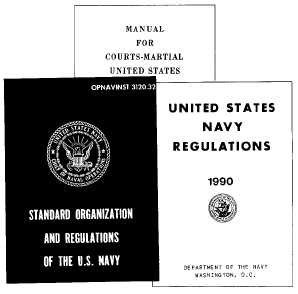PETTY OFFICER’S RESPONSIBILITY
Learning Objectives: Recognize the importance of
informing the chain of command (COC) on matters
pertaining to good order and discipline. Recall
procedures for reporting an offense. Recognize the
proceedings leading to captain’s mast. Identify the
procedures for redress of grievances/complaints of
wrongs. Identify the composition of courts-martial.
Recognize which violations should or should not be
reported.
When you become a PO, your position in the Navy
changes. You become a leader with authority. The
rating badge symbolizes delegation of this authority by
the Navy.
The responsibilities of a petty officer are not
always easy to carry out. You have to make decisions,
plan jobs, and take the blame if plans go wrong. You
have to lead your people, teach them, and correct them.
You can’t always be a “good guy.” You have to give
orders and that can be harder than following them.
The higher you advance, the greater your
responsibilities. Is the advancement worth the
responsibilities you will have? Yes. A strong PO is
willing to shoulder the burden of increased
responsibility to make the Navy a better, more efficient
force.
As a petty officer, occasionally you will have to
warn, reprimand, or even place personnel on report.
Although these tasks may be disagreeable to you, they
are part of the responsibility of a PO.
Standard Organization and Regulations of the U.S.
Navy, OPNAVINST 3120.32, states the following:
“Authority should be delegated to the lowest level of
competence commensurate with the subordinate’s
assigned responsibility and capabilities. The
principles of delegation, however, also recognize that
officers at all levels must be accountable ultimately for
the performance of their organizational segments even
if they have charged subordinates with immediate
authority for managing certain functions.” That, in
effect, means although you may assign a task to your
subordinates, you are still responsible to your
superiors for its accomplishment. A good leader does
not tell his or her supervisor, “I gave that job to Seaman
Recruit John R. Doe, but he messed it up.” Rather, he
says, “I will do better next time.” That leader then pays
more attention to Seaman Recruit Doe’s training and
job performance to be sure John R. Doe understands
the job and its importance.
REPORTING VIOLATIONS
The hardest job for a PO to do is to place a person
on report. After that happens, the petty officer always
wonders if there could have been another way to handle
the situation. One of your duties as a PO is to start
disciplinary action wherever and whenever the need
arises.
Every petty officer is an important part of the
disciplinary chain of command. You must show
offenders that the command will punish improper
conduct, especially cases of willful violation.
Your responsibility as a petty officer never ends. It is
a 24-hour-per-day duty that can be very trying at times.
For example, when people are ashore “winding down”
after a long period at sea, a demanding fleet exercise, or
even actual combat, rivalries sometimes form. Rivalries
are healthy until the Sailors imbibe in too many spirits or
carry the rivalry too far. These situations rarely occur;
but when they do, responsible petty officers must act. If
you are the senior petty officer present when a fight
breaks out in a liberty boat or when a brawl involving
enlisted personnel starts in town, you must help in
quieting the disturbance, whether an officer is present or
not. If you face such a situation and you do your job to
the best of your ability, you can be proud.
If an enlisted person violates a regulation in the
presence of both an officer and a petty officer, the petty
officer should correct the person. Failing to correct the
person could result in a reprimand for the petty officer.
Figure 2-1 shows three official sources for basic
disciplinary laws. The UCMJ is an appendix of the
Manual for Courts-Martial.
2-3
Figure 2-1. Three official sources for basic disciplinary laws.


